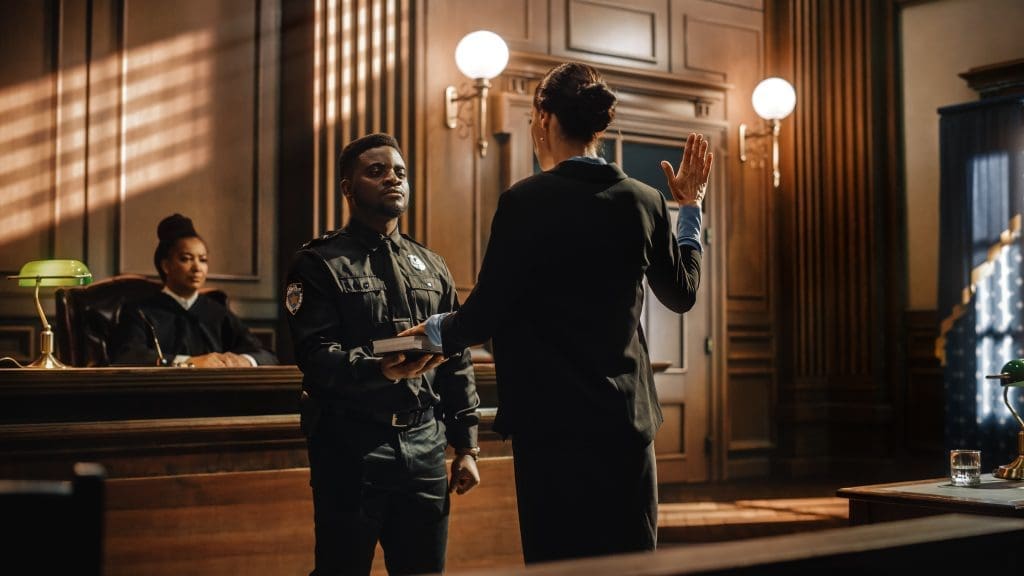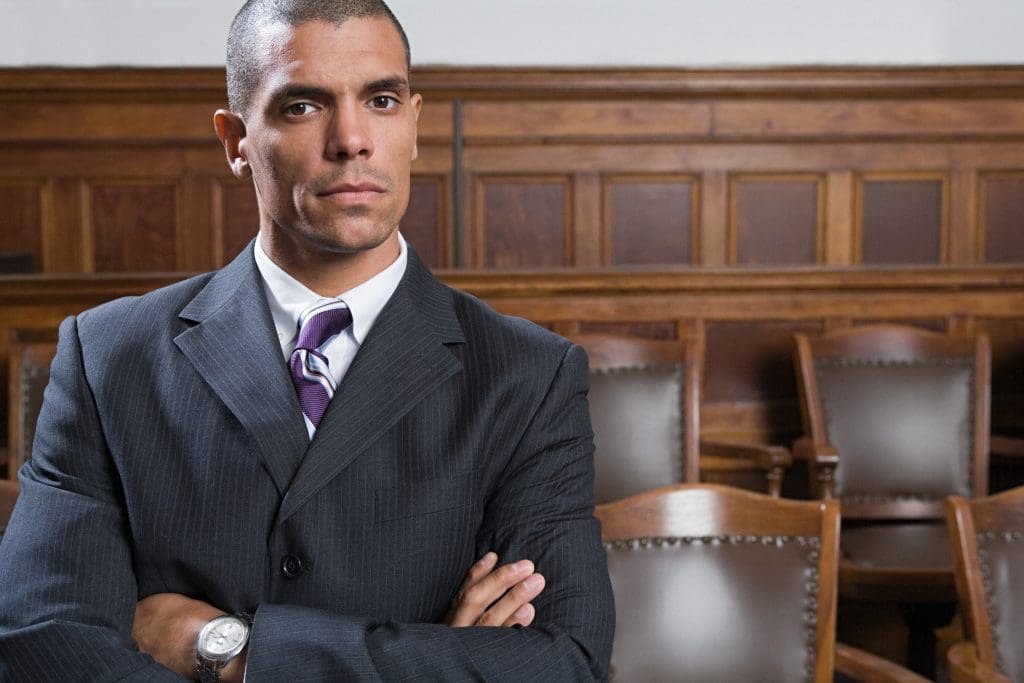8 Things Every Defendant Must Know!
A GUIDE TO COURTROOM ETIQUETTE
by the late Mark Sullivan, Board Certified Criminal Defense Attorney, Palm Springs, California. Originally printed in 2005 and reprinted with permission from Crime, Justice and America magazine
If you’re a defendant in the courtroom, your demeanor and attitude will be noticed – by the prosecutor trying to convict you, by the probation officer who might be charged with evaluating you, and by the judge who desires to give you a fair trial, fair rulings, and perhaps a fair sentence. But the jurors’ impressions are the most important. In fact, jurors are instructed that one of the many factors that they can and should take into consideration in determining the credibility of a witness (including the defendant) is his or her demeanor, and the attitude the witness maintains in court.

1 – Arrive Early
You should have made all necessary arrangements to arrive at the courthouse, and eventually at the appropriate courtroom, about 30 minutes early. Never park illegally, and never risk being seen in an inappropriate vehicle or with inappropriate acquaintances. Prosecutors and courtroom deputies can and do notice.
Arriving early will give you an opportunity to familiarize yourself with your surroundings and to meet and confer with your attorney regarding any last minute questions or comments, and will assure that you will never be late for your appearance. When you arrive early, you may find the courtroom door locked. Sit quietly on the bench nearest your courtroom, and be sure to follow all of the instructions of the bailiff or courtroom officer.
Often, an attorney will arrive late for a court appearance; but judges understand that they usually have to be in more than one courtroom at a particular time. If your attorney is not in the courtroom, you should sit patiently and politely for him or her to arrive.
Never be late for a court appearance. Judges, who have to be on time for court, expect the same of you. Some judges consider it a major transgression, and take defendants into custody when they arrive late. But all judges consider it impolite, and indicative of an irresponsible individual who obviously does not take his criminal case seriously.
2 – Dress To Impress (Win)
You never have a second chance to make a first impression, and your courtroom attire says a lot about your attitude and respect for the court and the judge. I always tell my clients to dress as if they were going to church, to a funeral, or on an important job interview. Personally, I don’t care whether or not you’re a professional: This is the most important thing going on in your life right now, and I want you to take every opportunity to gain the upper hand.

I try at all times to be the best-dressed lawyer in the courtroom. It is my goal that no DA is ever better dressed, more appropriately dressed, or more expensively dressed than I, especially when I am in trial, and this helps to give me confidence. There is no reason you should not be the second-best dressed person in the courtroom. (This always annoys the DA.)
Wear a suit if possible. If you don’t wear suits to work, invest in one. You don’t need to buy an entire wardrobe, even if you are going to be in a prolonged trial.
You should make sure you’re well groomed, alert, and in the right frame of mind (This obviously applies to in-custody defendants as well). Haircuts are mandatory. No visible tattoos, and no facial jewelry of any kind for men. The formality of dress clothes, and good grooming, results in added confidence, intimidation of the prosecutor, and an indication to the judge of your respect or the court. But it’s the jury who will decide your fate, and if they come into court for the first time, they shouldn’t be able to tell who is the attorney, and who is the criminal defendant. If you see them looking around for the defendant, then you know that they’ll be impressed with how seriously we take our case.
3 – Attitude
It’s always important to show respect for the court. Answer the judge’s questions in a loud, clear and confident voice, and always answer, “Yes, sir” and “No, sir.” Attorneys address the judge as “Your Honor.” As a defendant, you may do this, but I like you to address them as “sir” or “ma’am,” because when a defendant addresses the judge as “Your Honor,” it sounds as if his attorney has prepped him. This is not a bad thing, but if you answer the judge’s questions with a “Yes, sir” or a “No, sir,” it will indicate to the judge that you are not just doing what your lawyer instructed you to do, but that this is the way you speak in normal polite conversation with people whom you respect. Look the judge in the eye when you speak with him or her, but don’t be afraid to ask permission to consult with your attorney if you need to.
4 – Contact With The Prosecutor
Sometimes, prosecutors will try to talk to you – either directly, making “small talk”, or under the pretext of talking to your attorney while you’re in close proximity. I tell my clients to totally ignore the prosecutor if this happens. This is for many reasons, the two most important of which are: The prosecutor is committing an ethical violation; and he is probably doing this to attempt to gain information, or some insight into your personality, or some other tactical advantage.

Remember, the prosecutor is your worst enemy. Being nice to him sends a bad message, that you have some sort of respect for him, and that you want to endear yourself to him. But ignoring him lets him know that you are not worried about what he thinks of you in terms of your respect for him. You are not going to show any sort of respect for a lawyer who wants you convicted, because, after all, his evaluation of the case and his going forward with your prosecution is a reflection of his poor judgment and case evaluation.
The one exception to this rule if the court instructs you to answer the prosecutor’s questions, such as your giving a time waiver or responding to questions about rights and consequences of a plea bargain. Your attorney will instruct you as to what is going to happen in such an instance.
5 – When Your Case Is Called
As soon as your case is called, stand up and come forward. Unless yours is the very first case called that morning, you will have already seen other litigants approach their attorney, and will know what the courtroom deputy expects of you. Don’t put your hands in your pockets, and don’t have anything in your hands, other than possibly some paperwork you need to have the judge inspect. Females should leave their handbags on their seat when they approach. Stand up straight, and stand immediately beside your counsel.

Speak only if your attorney instructs you to. Even if a routine question is asked, do not volunteer the answer unless your attorney instructs you to do so. Remember, as a criminal defendant, you have the absolute right to remain completely silent, and you should keep this in mind at all times. Sometimes, a seemingly routine question is asked, such as how you pronounce your name, or your date of birth. Your attorney should know enough about your case to answer those types of questions himself; but if he does not, whisper the answer to him or her, and let them speak for you.
There is a difference between a whisper and speaking softly. A whisper is a form of speech without the use of your vocal cords. Speaking softly is just that, using your vocal cords, but quietly. My rule is that you should never speak to your attorney or someone sitting with you. You should always whisper, because it is more polite, and no one can hear you but the person to whom you are talking.
6 – Motions And Other “Long Cause” Matters
When your case is called for a hearing that is expected to last more than a minute or so, or if your appearance is for trial or the taking of testimony, either your lawyer or the judge will instruct you to where sit, or the courtroom officer will move you. You will always be seated in close proximity to your lawyer, usually at counsel table. Feel free to whisper to your lawyer, but not while a witness is testifying or the court (judge) or another attorney is speaking. Your lawyer needs to give that person his undivided attention, and your whispering to him will be a distraction.

If your attorney is on top of things, he will have provided you with paper and pen, for you to write down questions and comments for him. At the appropriate time, your lawyer will read your notes, consult with you, and act accordingly.
In a jury trial, it’s customary to stand whenever the jury enters or leaves the courtroom.
7 – Keeping A Poker Face
It’s very important for you to maintain your sense of innocence at all times, but you should never react negatively (or positively) to any testimony. The jury expects that you have heard or read all of the negative evidence before you hear it from the witness stand, so if you react negatively to certain evidence, you could be tipping them off as to what evidence is true and what is not true. For example: You may hear an adverse witness testifying about all sorts of incriminating evidence, and then hear something that causes you to react with body language or different demeanor. This immediately tells the jury that all of the previous incriminating evidence is true, and that you only dispute the most recent testimony.
If you simply keep a poker face – that is, sit quietly and politely through the entire trial — they will not be tipped off as to what you dispute, and what you don’t. Because you as a defendant have the right to go last, after all of the prosecution evidence has been laid out, and have the right to remain silent and testify if and only if you decide to, the jury will have a tendency to keep an open mind and give you the benefit of the doubt.
8 – Leaving The Courtroom
As soon as your matter has been concluded, you will undoubtedly have some follow up questions for your lawyer about what just happened, and when you need to be in court again. Do not ask him any questions while standing with him at counsel table. There will be another case called immediately after yours, and sometimes your attorney will be involved with that case. Wait until you have exited the courtroom, and your attorney will likely follow you outside into the hall. Be careful not to ask any questions until you are both alone and in a quiet place.

Sometimes the prosecutor will be leaving the courtroom at the same time, and you certainly don’t want anyone, especially the prosecutor, to hear what you are saying to your lawyer.
Most of the time, your lawyer will tell you to write your questions down, and call him at the office later in the day. On other occasions, he may need to explain certain things to you immediately, such as where to go before leaving the court complex. In any event, do not ask for any advice while you are still in the courtroom, as it is impolite to the other litigants who want and expect the court’s complete attention.














